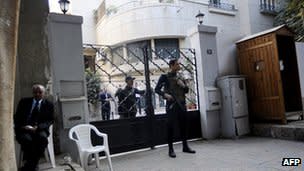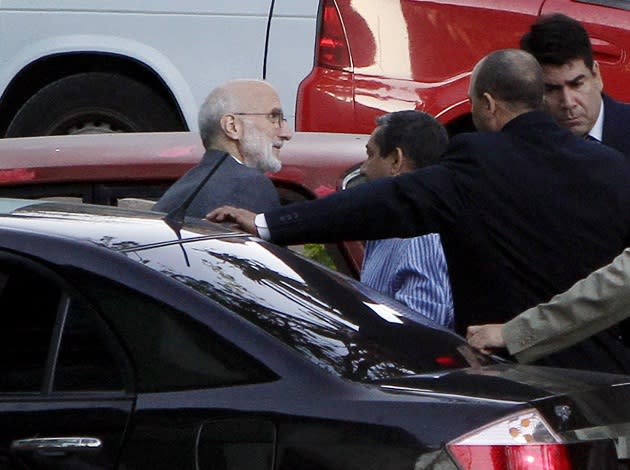 The Envoy
The EnvoyU.S. democracy promotion backlash? As Egypt said to lift travel ban on U.S. democracy workers, some say programs cause resentment

Egyptian officials said on Wednesday that a travel ban has been lifted on U.S. pro-democracy workers previously barred from leaving the country, the Associated Press reported.
The United States has not yet received formal confirmation of the reported decision, State Department spokesman Mark Toner told Yahoo News Wednesday. But he said "we feel like we are getting really, really close."
Seven American citizens currently in Egypt are among some 40 pro-democracy group workers who have been formally charged by Egyptian prosecutors with being improperly registered and illegally receiving foreign funding. Most prominent among them is Sam LaHood, the son of U.S. Transportation Secretary Ray LaHood and the head of the International Republican Institute's Cairo office, who has taken shelter at the U.S. Embassy there since being barred from leaving the country in January.
The standoff has opened the biggest rift in U.S.-Egyptian relations in some three decades, with American lawmakers threatening to cut off some $1.3 billion in annual U.S. foreign assistance funds to Egypt.
It has also generated some soul-searching among some veterans of U.S. government-funded pro-democracy programs about whether the programs tend to foster resentment and suspicion more than they advance democracy and civil society groups abroad.
"If someone comes into your house, and says 'this color is awful and you need to change the shade' and goes on and on, you'd say 'fine, don't come back,'" Ben Barber, the former lead writer of the U.S. Agency for International Development (USAID) newspaper and former journalist, told Yahoo News in an interview this week. "No matter how crappy it is, the country does not want to be treated like a basket-case."
American officials have hinted for days they saw signs the crisis over the U.S. NGO workers was moving toward a resolution. The trial of some 40 NGO workers that was slated to begin in Cairo on Sunday was abruptly adjourned until late April shortly after opening.
Among the U.S.-based democracy groups with employees facing charges are the International Republican Institute, National Democratic Institute and Freedom House. The International Republican Institute did not immediately return a call from Yahoo News Wednesday on whether it has received confirmation of the lifting of the travel ban.
A defense lawyer for some of those charged told the Associated Press Wednesday the Americans would be required to post some $300,000 bail and sign pledges agreeing to attend the next trial date.
Barber also questioned whether U.S. pro-democracy programs in many authoritarian countries have really shown lasting results.
"The reality is that these are countries that have been ruled by brutal people for centuries, and people don't trust each other," he said. "And they have never seen a fair justice system and law and order."
"I am not saying we shouldn't attempt to assist people who want democracy, but we have to be very low key," he added. "It might be better off if we can do regional programming."
Stephen McInerney, executive director of the Washington-based Project on Middle East Democracy (POMED), defended the initiatives, saying the recent model of U.S. democracy assistance that connects civil society activists across their regions and helps them share successful "lessons learned" is valuable--and hardly heavy-handed.
"Democracy activists in the Arab world who suddenly face these transitions ... want to learn about successful transitions," McInerney told Yahoo News in an interview this week. "They don't want Americans and Western Europeans to tell them how to run their transition. But they want help in lessons learned and experiences, and they are especially interested in countries that transitioned to democracy recently," such as those in Central Europe.

Even as the Egypt NGO case seemed to be moving towards resolution, the case of another USAID-funded democracy worker jailed in Cuba has raised new questions--and suspicions.
Alan Gross, an international development specialist from Maryland, was sentenced to 15 years in prison in Cuba last year for allegedly illegally bringing sensitive communications technology into Cuba under a $500,000 subcontract from USAID to boost the Cuban Jewish community's access to the Internet, the Associated Press reported earlier this month.
"The operation was funded as democracy promotion for the U.S. Agency for International Development," the AP's Desmond Butler wrote in his Feb. 12 investigation. "Gross, however, identified himself as a member of a Jewish humanitarian group, not a representative of the U.S. government. Cuban President Raul Castro called him a spy, and Gross was sentenced last March to 15 years in prison for seeking to 'undermine the integrity and independence' of Cuba. U.S. officials say he did nothing wrong and was just carrying out the normal mission of USAID."
Among the technology equipment Gross is alleged to have secretly brought into Cuba as part of his USAID-funded pro-democracy work, Butler reported: "a specialized mobile phone chip that experts say is often used by the Pentagon and the CIA to make satellite signals virtually impossible to track."
Sen. Patrick Leahy (D-Vt.), who last week led a Congressional delegation to Cuba to try to seek Gross's release, said resolution of that case did not appear imminent. "We have a long way to go" to win his release, Leahy told the Associated Press.
More popular Yahoo! News stories:
• U.S.-Israel tensions flare over Iran ahead of Netanyahu visit
• U.S. announces diplomatic breakthrough with North Korea
• New IAEA report shows Iran expands nuclear enrichment at Natanz
Want more of our best political stories? Visit The Ticket or connect with us on Facebook, follow us on Twitter, or add us on Tumblr. Handy with a camera? Join our Election 2012 Flickr group to submit your photos of the campaign in action.

